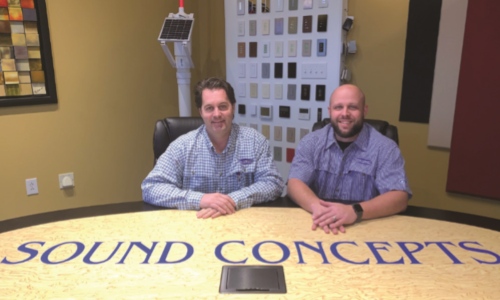Sound Concepts, Jonesboro, Arkansas
iPoint Software Helps Integrator Reduce Potential for Human Error
Sound Concepts in Jonesboro, Ark., uses iPoint software to speed up its billing and inventory processes, and reduce human error.

Ryan Heringer (left), owner and president, and Jimmy Smith, operations manager, of Sound Concepts in Jonesboro, Ark., use iPoint to produce daily reports that enable them to track every aspect of the business.
It’s 5 p.m., do you know how your custom integration business performed today? Unfortunately, for many custom integrators, the answer is “no.”
For many owners of smaller integration companies who are in the field themselves on sales calls or performing installations, there is often no time at the end of the day to know if checks arrived in the mail, if proposals were signed, or if clients emailed or called requesting service.
Medium- to large-sized CE pros grapple with the same problems, plus if they don’t know the status of various projects in the field, it can be impossible to set the installation schedule and determine the equipment needs for the following day. It is a never-ending cycle.
But for the team at Sound Concepts in Jonesboro, Ark., there are no questions at 5 p.m. with iPoint’s Morning Coffee dashboard reports.
“Every day at 5 o’clock, we have our morning coffee, or in our case, it’s our evening coffee,” quips Jimmy Smith, operations manager, who works closely with president Ryan Heringer to track the data.
“Every day at 5 o’clock, we get a report on all the P.O.’s that were created, how many were submitted, and how many still need to be submitted. We also get a rundown of all our receipt payments that have come into our accounting department. Other things that it reports for us would be when a sales order is fully staged and ready for scheduling.”
“Morning Coffee” is a configurable reporting engine from iPoint that enables the delivery of ad-hoc email reports to specific users on a specific schedule. Those emails can cover multiple aspects of the business and can be set up by the user. In addition to the ones Heringer and Smith have created at Sound Concepts, other common email reports cover project management, warehouse management, sales orders, change orders committed, amount of new invoices, invoices aged 30 days, work orders completed, and work order time detail.
“My favorite part of iPoint from an operations/project management standpoint is just being able to see everything that is going on. I know where the guys are, and what job they are clocked in on. I know what projects we have going that day and which products are staged and ready to go. Before iPoint, I would have to pull reports from a Quickbooks estimate and sometimes it could take a few days,” says Smith.
Getting Everyone Onboard Is Vital
Smith says the biggest challenge with iPoint actually has nothing to do with the software itself.
“As with any software, data out is only as good as data in. Every employee has to really care about what they are putting into the software and that takes a fair amount of training and education. At Sound Concepts, we’ve found that our recurring monthly meeting is a great time to bring up new ideas about the software and go over any misunderstandings. Everyone in your company has to understand that this software will work great for you, but you have to have everybody on board,” he advises.
At Sound Concepts, the benefits to the company from iPoint implementation have been numerous.
“Billing has sped up. Proposals are done faster. Inventory management has sped up. Overall, iPoint has just increased our efficiency,” says Smith.
For example, proposals can now be done from anywhere versus having to drive back to the office to create one.
“If I’m on a jobsite and it is a small proposal, like a client just wants a TV installed with seven speakers, I can say, ‘OK, cool. Hold on one second.’ I can run out to the truck, pull out my iPad, create a proposal, walk back into the house and have them sign it right there. In the past, I would have to drive back to the office and send them an email. Then we might converse 15 more times and one week later I would get something signed off,” relates Smith.
While larger projects are normally taken back to the office to engineer them out, Sound Concepts has condensed a process that in many cases would take one week from conception to signature down to less than an hour.
Tracking technicians’ time is another huge benefit Sound Concepts has gotten from the software.
“Previously to track our time and materials, the guys would archaically send in emails with their time. Then, we’d have a person here in the office—either a salesperson who might have extra time or someone in the accounting department—actually extract the time from those emails, go back into the estimate and manually calculate the time so we could accurately bill the project,” recalls Smith.

